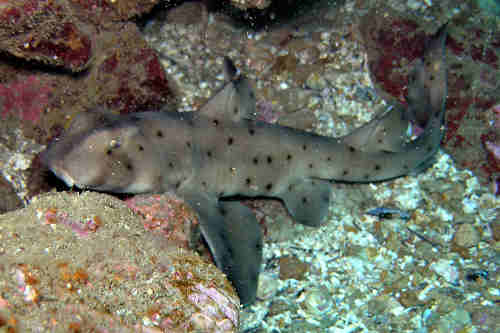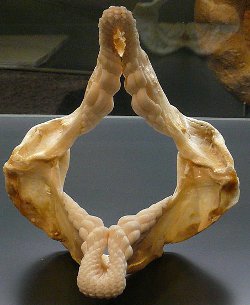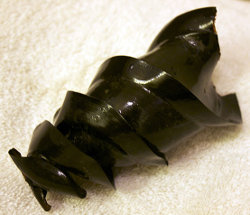Heterodontidae
The Bullhead, or Horn Shark Family
Members of the heterodontidae family are also known as bullhead sharks or horn sharks.

The family is made up of one genus and nine species.
|
|
These sharks belong to the the order Heterodontiformes. They are ancient sharks and the order has good fossil records, but the Heterodontidae make up the only living family.
Characteristics
- General body shape - I just love the faces on these little guys. They have short stubby little snouts and look kind of 'piggy'.
They're small sharks, most of them being less than 100cm long, though the Port Jackson may grow to over a metre and a half.
- Eyes - The eyes are set in prominent eye ridges and have no nictitating membranes.
- Teeth - The name
means different, or other, teeth. It's derived from the fact that these
sharks have little pointy teeth at the front of their mouths for
holding on to prey, and large blunt ones at the back for crushing it.
They are benthic feeders and eat mainly invertebrates such as sea urchins, crabs and molluscs.
- Gills - They have five pairs of gills, with the first ones being larger than the others. They also have small spiracles behind the eyes.
- Fins
- They have two dorsal fins, both with spines, an anal fin, an
asymmetrical caudal fin with well developed upper and lower lobes, and
paddle shaped pectoral and pelvic fins.
The cool thing about these little guys is that they don't just use their fins for swimming. They can also 'walk' along the seabed.
Bullhead sharks are all
oviparous and lay distinct looking spiral shaped egg cases. The pups
usually hatch after about 5 months. The egg cases often become wedged
between rocks on the seabed.
They're sluggish sharks and tend to
be slow. Some spend their days hanging out in caves and crevices,
coming out at night to feed.
These sharks
are generally not targeted by commercial fisheries, but they are
vulnerable to bycatch. Sports fishermen and spear fishermen have also
been known to take them.
Return to World of Sharks from Heterodontidae

Port Jackson Jaws

Horn Shark Egg Case
Recent Articles
-
Thresher Sharks
Aug 27, 14 10:51 AM
Thresher sharks are unmistakable with that huge upper lobe on the caudal fin. Let's find out more about them. -
Sharkwater
Aug 14, 14 12:42 PM
Sharkwater is a documentary by Rob Stewart highlighting the plight of the sharks in our oceans. -
Natural Cleaners
Aug 13, 14 08:57 AM
Natural cleaners and homemade skincare products are not only better for the environment, they're better for you and your family.
